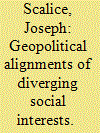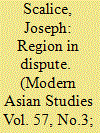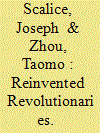|
|
|
Sort Order |
|
|
|
Items / Page
|
|
|
|
|
|
|
| Srl | Item |
| 1 |
ID:
188724


|
|
|
|
|
| Summary/Abstract |
This article documents a significant and previously unknown episode in the history of Philippine labor, the explosive Manila Port Strike of the arrastre service workers—stevedores and longshoremen—in 1963. The strike was among the largest, costliest and most politically charged labor struggles in the nation's history and yet not only has no account of it been written, it has found no mention in over a half-century of historiography. Using confidential US State Department memoranda, contemporary newspaper accounts, Partido Komunista ng Pilipinas (PKP) publications, and material published by the Lapiang Manggagawa (LM), I reconstruct the history of the strike. This article examines how an event of this magnitude, while still part of living memory, could disappear from the historical record. The case of the 1963 Port Strike highlights the need to recover the histories of the oppressed by reading not only the official archives, but also the narratives of the workers’ own organisations, against the grain.
|
|
|
|
|
|
|
|
|
|
|
|
|
|
|
|
| 2 |
ID:
178627


|
|
|
|
|
| Summary/Abstract |
In April 1967, the Partido Komunista ng Pilipinas (PKP) broke in two. This article examines how a contradiction at the heart of the party’s program, which sought to retain leadership over both a mass movement and an alliance with a section of the elite, fragmented the party along the lines of the Sino-Soviet dispute. The ideological expression of the rival national interests of the Soviet Union and People’s Republic of China found congruent alignment with the diverging social forces in the PKP. The Soviet bureaucracy offered attractive terms of trade to countries of belated capitalist development. Sections of Filipino capitalists saw this as a means of developing national industry, and leading layers of the PKP allied themselves with the Marcos administration in support of these ends. In contrast, a cultural revolution and a protracted people’s war expressed the geopolitically imperiled position of China. University-based youth were drawn to this perspective. Over the course of 1966, the PKP was torn apart along the fault-lines of the Sino-Soviet ideological split, as this global dispute gave political form to the diverging social interests within the party.
|
|
|
|
|
|
|
|
|
|
|
|
|
|
|
|
| 3 |
ID:
160260


|
|
|
|
|
| Summary/Abstract |
Reynaldo Ileto, in his classic Pasyon and Revolution, sought the categories of perception of the Filipino ‘masses’ that guided their participation in the Philippine Revolution. Among the sources he examined was the Carpio legend, which he unfortunately subsumed to the separate, elite Carpio awit (Tagalog poem). Through a detailed examination of the legend's historical and geographical context, with its invocation of two locations, Pamitinan and Tapusi, I arrive at a different understanding of lower-class consciousness than Ileto. Rather than a counter-rational expression of peasant millenarianism, the legend of Bernardo Carpio was a ‘hidden transcript’ celebrating the history of social banditry in the region.
|
|
|
|
|
|
|
|
|
|
|
|
|
|
|
|
| 4 |
ID:
193623


|
|
|
|
|
| Summary/Abstract |
Prior scholarship has treated the Philippines as an outside party to the conflict over the formation of Malaysia, known as Konfrontasi, which has been dealt with as a dispute between Malaysia and Indonesia. This article demonstrates the centrality of the Macapagal administration to the origins of Konfrontasi. Treating Manila as a core actor gives new insight into Konfrontasi, which can be best understood as a regional conflict over the racial and social shape of island Southeast Asia in the final stages of decolonization. Racialized anticommunism, expressed through the forcible redivision of the region to ensure social stability, emerges as the preoccupation of all the state actors promoting and opposing the formation of Malaysia. At the same time, an examination of developments in the Philippines and the actions of the Partido Komunista ng Pilipinas (PKP) gives new insight into the critical function of the Partai Komunis Indonesia (PKI) in this affair.
|
|
|
|
|
|
|
|
|
|
|
|
|
|
|
|
| 5 |
ID:
180344


|
|
|
|
|
| Summary/Abstract |
There is an abruptness to exile. Exile is defined far less by our distance from any particular place or people and far more by the consciousness that they are irrevocably unreachable. In counterpoint, our sense of cosmopolitanism rests not in the act of travel but in its possibility. It is for this reason, the curtailment not simply of travel but also the imagined possibility of travel, that the Covid-19 pandemic has bred a sense of exile around the globe. Even if we are now trapped in what we would regard as home, many of us nonetheless have a jarring sense of fixity, a feeling that we are exiled global citizens. We necessarily and often unconsciously adapt our routines and habits—and imperceptibly but ineluctably our goals and beliefs will change as well—in keeping with the much altered world and our much altered place within it.
|
|
|
|
|
|
|
|
|
|
|
|
|
|
|
|
|
|
|
|
|